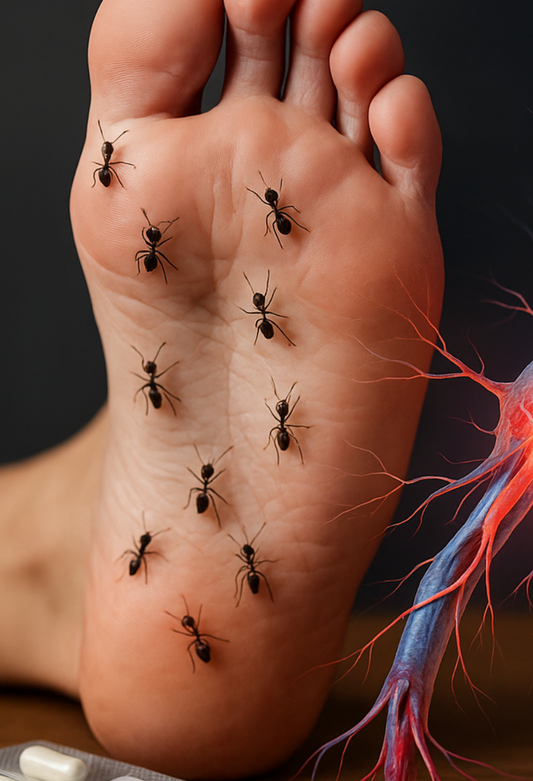Why your diet makes the difference and how to recognize hidden triggers.
Intolerances are a big issue in our family - histamine, lactose, wheat, everything is there, and sometimes I ask myself: Can intolerances also be imaginary? Is it simply "in" at the moment to demonize certain things, or are intolerances perhaps really more widespread because our diet and lifestyle have changed? In our new article we look into these and other questions. As always, we explain to you exactly what is happening in your body and what you should look out for if you suffer from polyneuropathy or restless legs.
Intolerances at a glance – What is really behind them
A food intolerance is more than just a modern trend. It occurs when your body cannot process certain substances or can only process them inadequately. Unlike an allergy, in which the immune system is actively involved, an intolerance is often a digestive problem. Enzymes that are necessary for the breakdown of certain substances are missing or present in too small quantities. The most common diagnoses include lactose intolerance, histamine intolerance and gluten intolerance.
But why do so many people struggle with it today? There is evidence that our modern lifestyle - from changing diets to increased stress levels - is contributing to the increased prevalence of intolerances.
lactose
In lactose intolerance, the body lacks the enzyme lactase, which is necessary to break down milk sugar (lactose). This process causes undigested milk sugar to reach the large intestine, where it is broken down by bacteria - the result: bloating, stomach pain and diarrhea.
histamine
Histamine, a substance found in many foods, plays an important role in allergic reactions and inflammation. With histamine intolerance, the body cannot break down the histamine from food quickly enough, which leads to headaches, skin rashes and digestive problems.
gluten
Gluten intolerance, also known as celiac disease, is an autoimmune disorder in which the immune system reacts to the gluten found in wheat and other grains, causing severe intestinal damage. However, there are also people with non-celiac gluten sensitivity who have similar symptoms without an autoimmune reaction.
Polyneuropathy, gluten and histamine: are there any connections?
For people with polyneuropathy or restless legs, the connection to intolerances can go deeper than just stomach pain or bloating. Gluten in particular is suspected here. There are studies that show a connection between non-celiac gluten sensitivity and neurological diseases such as polyneuropathy. A study from Italy (2016) examined 300 patients with neurological complaints, including those with polyneuropathy. It turned out that almost 30% of these patients had gluten sensitivity without suffering from celiac disease. The researchers suspect that gluten can affect the nerves via inflammatory processes, which makes the symptoms worse. A gluten-free diet led to an improvement in symptoms in some patients.
Histamine, which is responsible not only for allergic reactions but also for inflammation in the body, could play a similar role. Inflammatory processes are a key mechanism in polyneuropathy. It is suspected that histamine overload from foods such as aged cheese, red wine or fish could exacerbate nerve symptoms. Unfortunately, large-scale studies are still lacking, but initial small studies indicate this connection. The exact mechanism by which histamine affects the nervous system has not yet been fully clarified. However, there is evidence that histamine receptors in the nervous system promote inflammatory processes that are particularly problematic in polyneuropathy patients.
nutrient deficiency and polyneuropathy
If your intestines are not functioning properly because they are struggling with intolerances, you will see the result not only in the toilet, but also in your blood. Nutrients can no longer be absorbed properly and this can lead to dangerous deficiencies, which are particularly critical if you already suffer from nerve disorders such as polyneuropathy or RLS.
A deficiency in certain nutrients, such as B vitamins (especially B12) or magnesium, can significantly worsen the symptoms of polyneuropathy. These nutrients are essential for nerve function and their absorption can be impaired by food intolerances. The connection between nutrient deficiency and polyneuropathy is well researched. A deficiency in vitamin B12, which can be particularly critical in vegan or vegetarian diets, leads to damage to the myelin sheath, the protective layer around the nerve fibers.
If you notice symptoms of a nutrient deficiency - such as persistent fatigue, muscle cramps, numbness or tingling - your doctor can determine whether there is a deficiency through blood tests. Tests for nutrient deficiencies, such as vitamin B12 or magnesium, are usually covered by health insurance if there is a specific suspicion and corresponding symptoms are present. In the case of magnesium, however, only the blood level is often determined, which does not always reflect the actual supply situation, since the majority is stored in the tissue.
Our current diet and intolerances: What happens in your body?
Many experts agree that our modern diet has a decisive influence on the increase in intolerances. Processed foods are now an integral part of our diet - but this is not without consequences for our digestion and our immune system.
Processed foods: stress for the intestines
Processed foods often contain preservatives, flavor enhancers, sugar substitutes and trans fats that are foreign to the body. These ingredients can irritate the intestines and upset the balance of the natural intestinal flora. A healthy intestinal flora is essential for the immune system, because around 70% of the immune cells are located in the intestines. If the balance in the intestines is disturbed, inflammatory processes can arise, which in turn increase the risk of intolerances and chronic diseases such as polyneuropathy.
Processed foods also often contain a lot of "empty" calories and few nutrients. This means that while your body will be full, it will not be supplied with the vitamins, minerals and phytochemicals it needs to process these foods. Sugar and refined carbohydrates can increase insulin levels, which in the long term leads to inflammation and increased insulin resistance - a condition that also puts a strain on the nervous system and can contribute to symptoms such as fatigue, nerve pain and numbness.
Too much sugar and the "silent" inflammatory process
Sugar and processed carbohydrates cause blood sugar levels to rise rapidly, followed by an equally rapid fall. These fluctuations put the body under stress, which promotes the release of inflammatory substances such as cytokines. What is particularly problematic is that these inflammatory processes are often chronic and "silent", meaning they do not initially cause any noticeable symptoms. In the long term, however, they can affect the nerves and increase the risk of polyneuropathy.
Gut and Brain – A Close Connection
The so-called "gut-brain axis" illustrates how closely our digestive system and nervous system are linked. A disturbed intestinal flora can trigger inflammation not only in the intestines but also in the brain, which can increase the risk of neurological diseases. Studies suggest that an imbalance in the intestinal flora can promote inflammation and even depression and anxiety, which in turn exacerbate symptoms in polyneuropathy patients.
Practical tips for use
If you suspect that you are suffering from an intolerance, there are some steps you can take:
- Note symptoms: Keep a food diary and note when and after which meals you experience symptoms.
- Intolerance tests: Consult a doctor or nutritionist. There are now specific tests for lactose, histamine and gluten.
- Gradual change: Don't immediately eliminate all "suspect" foods. A gradual reduction or elimination diet will help to clearly identify the culprits.
- Enzyme preparations: If you are lactose intolerant, lactase preparations can help so that you do not have to completely avoid dairy products.
- Avoid foods rich in histamine: Matured, fermented and heavily processed foods such as cheese, red wine, sausage and canned goods in particular contain histamine and should be avoided if you have a histamine intolerance.
- Strengthen your gut health: Make sure you eat a balanced diet with high-fiber foods, such as whole grains, fruits and vegetables, to support your gut flora. Probiotics and prebiotics, which are found in fermented foods such as yogurt or sauerkraut, can help restore the balance of your gut flora.
- Get tested for nutrient deficiencies: Regular blood tests at your doctor can show whether you have a deficiency in vitamins or minerals that could play a role in your symptoms. Vitamin B12 and magnesium in particular should be monitored.
Conclusion: What you can take away for yourself
Intolerances are by no means just a trend, but can have a real impact on your health, especially if you suffer from polyneuropathy or restless legs. Our modern diet with lots of processed foods and hidden sugar can increase the risk of intolerances and nerve disorders. By paying attention to a healthy, natural diet and testing and treating possible intolerances, you can improve your well-being and benefit from more stable health in the long term. Pay attention to your body, adjust your diet and do not hesitate to seek professional help - you have the power to relieve your symptoms and make your life more pleasant again.















